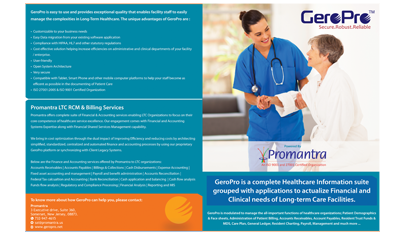
In long-term care, managed care contracts can feel like a double-edged sword. On one hand, they promise steady patient referrals and predictable revenue. On the other, they're packed with complex terms, reimbursement conditions, and hidden risks that can chip away at a facility's bottom line if not handled carefully. For Skilled Nursing Facilities (SNFs) and Assisted Living Facilities (ALFs), understanding these contracts isn't just smart---it's essential for financial survival and effective revenue cycle management (RCM). Mastering the intricacies of patient billing and the RCM process is crucial for long-term care providers to thrive in today's healthcare landscape.
What Exactly Is a Managed Care Contract?
A managed care contract is a legally binding agreement between a healthcare provider (like an SNF) and a payer (insurance company, Medicaid managed care plan, or Medicare Advantage plan). At its core, it spells out:
- Reimbursement Rates -- How much you'll be paid for each service.
- Covered Services -- What's included under the agreement and what isn't.
- Billing & Authorization Rules -- The steps needed for successful medical billing and claim submission.
- Timelines & Appeal Processes -- How fast you get reimbursed and what to do if claims are denied.
These contracts are fundamental to healthcare billing and often require expertise in billing and coding to navigate successfully. Understanding the nuances of these agreements is crucial for maintaining a healthy revenue cycle.
Why They Matter in Long-Term Care
Unlike hospitals or outpatient providers, SNFs and ALFs operate on thin margins and high dependency on reimbursements. One poorly negotiated clause in a managed care contract can mean thousands in lost revenue, significantly impacting the healthcare revenue cycle and patient collections.
Example: An SNF agreeing to below-cost per diem rates for post-acute care patients can end up subsidizing care out of pocket---crippling cash flow and disrupting revenue cycle operations. This can lead to increased accounts receivable days, further straining the facility's financial health.
Example: A facility that doesn't pay attention to prior authorization rules may see a spike in denied claims, leaving services unreimbursed and affecting accounts receivable. This underscores the importance of a well-structured RCM workflow to prevent revenue leakage.
The Pitfalls to Watch Out For
- Ambiguous Reimbursement Rates -- Not all "per diem" rates are equal. Some exclude ancillary services like therapy or pharmacy, leaving facilities underpaid and complicating the billing and collections process.
- Tight Authorization Requirements -- Missed authorizations = automatic denials, regardless of care quality delivered. This can lead to claim denials and disrupt the entire revenue cycle workflow, necessitating robust denial management strategies.
- Retroactive Denials -- Payers can claw back payments months later if documentation isn't airtight, affecting healthcare finances and revenue cycle efficiency. This highlights the need for meticulous medical coding and documentation practices.
- Unclear Dispute Resolution -- Without strong appeal timelines, facilities often eat the cost of disputed claims, impacting their billing processes and overall financial health. Effective billing error management is crucial to mitigate these risks.
How to Make Managed Care Contracts Work for You
The good news? With the right strategy, managed care contracts can be an asset to your healthcare revenue cycle.
Negotiate Smart -- Don't just accept payer rates; benchmark against market averages and push back where necessary.
Strengthen Documentation & Compliance -- Ensure every service is documented to payer standards to protect against denials and support clean claims processing.
Leverage Data Analytics -- Track contract performance to see which payers are profitable and which are draining resources, optimizing your revenue cycle management.
Train Staff on Contract Nuances -- A well-trained billing team reduces costly errors tied to authorizations and claim submission, improving overall billing accuracy and payment posting efficiency.
Where LTCPro Steps In
At LTCPro, we know managed care contracts inside out. Our specialists help facilities optimize their revenue cycle management through comprehensive RCM services:
- Decode the Fine Print → So you know exactly what you're signing, improving billing compliance.
- Optimize Negotiations → Securing fairer reimbursement terms and enhancing the healthcare revenue cycle.
- Stay Audit-Ready → With systematic documentation and compliance workflows, supporting efficient claims management.
- Maximize Collections → Ensuring every dollar you've earned makes it to your bottom line through effective billing and collection strategies.
In short, we turn managed care contracts from a liability into a strategic advantage for your revenue cycle operations. Our expertise in revenue cycle automation helps streamline processes, reduce errors, and improve overall financial performance.
Final Thought
Managed care contracts are here to stay---and their complexity isn't going away. But for long-term care providers, understanding and mastering them is the difference between leakage and longevity in the healthcare revenue cycle.
With the right partner, you don't just sign the contract. You own it. And with LTCPro by your side, you're not just surviving managed care---you're thriving in it, optimizing your revenue cycle management every step of the way. From patient registration to final payment posting, our comprehensive approach ensures that your facility maximizes its revenue potential while providing top-quality care.
A perfect fit for Skilled Nursing Facilities, Assisted Living Facilities, Home Health, Hospice and Other Day Care Centres.
Download BrochureRequest a demo


























